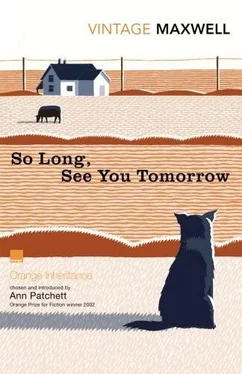The house is her one great accomplishment. Against all odds she has managed to hang on to it. "It's a poor man's house," she loves to say, "and not much to look at." It doesn't do to brag about your possessions, especially to people who have less. The mortgage is paid off and she doesn't have to take in roomers. It is all hers — meaning the pollarded catalpa tree by the front sidewalk, the woodshed around in back, the outside sloping cellar door, and the porch light that doesn't turn on. Meaning also the white net curtains that have turned grey and are about ready for the ragbag, the nine-by-twelve linoleum rug in the front room, with the design worn completely away in places, the ugly golden-oak furniture that could be duplicated in any secondhand store, "Sir Galahad" and "The Dickey Bird," and the smell of the kerosene heater. The two upstairs rooms are hot in summer and expensive to heat in winter, and so she doesn't use them. The big double bed all but blocking the front door makes the front room look queer, but she has stopped caring what people think. She means to die here, in her own house, in this very bed.
Meanwhile, she is not alone in the world. From the fairgrounds to the first fence post of the farm is a little over a mile, and when Aunt Jenny is feeling blue she puts on her hat and coat and, armed with grape jelly or a jar of pickles, pays them a visit. She tries not to come too often and she is careful never to take sides between husband and wife. Blessed is the peacemaker for he shall — inherit the kingdom of heaven?… see God? She can't remember, offhand, and keeps meaning to open the Bible to Matthew 5, and see which it is. Clarence is kind to her and brings her fruit and vegetables that she cans and lives on all winter. Fern is in the habit of leaving Wayne with her when she goes to the stores. And used to do the same thing with Cletus when he was small.
"Come and give your old auntie a kiss," she says now when Cletus appears in the doorway. "I know you don't like to kiss people but it won't kill you, not this once."
"It's going to rain," he says, and either his mother doesn't hear him or else she failed to connect what he has just said with the washing on the line. He goes on upstairs and takes off his school clothes and hangs them on an already overcrowded hook. The room gets progressively darker as the rainstorm that is moving across the prairie approaches.
Even in the dead of winter, the only heat there ever is in this room comes through the ventilator in the floor. Voices also are carried by it. Though he can hear the conversation in the room below, he manages not to understand it. What sounds like somebody moving furniture around is the first thunder, faint and far away.
The water in the china pitcher comes from the cistern and is rainwater and rust-colored. He fills the bowl and the water immediately turns cloudy from the soap and dirt on his hands. From the room below he hears "Fortunately I have witnesses."
Him, among others. She has — his mother has fits of weeping in the night. The walls are thin. Lying awake, he hears threats he tries not to believe and accusations he doesn't understand. And envies the dog, who can put her head on her paws and go to sleep when she doesn't like the way things are.
Raindrops spatter against the windowpane and he turns and looks out. The tops of the trees are swaying in the wind. The sky behind the windmill is a greenish almost-black, and his mother and Aunt Jenny, with their coats over their heads, are yanking the sheets from the line. There is a flash of lightning that makes everything in sight turn pale, and then deep rolling thunder.
He goes on soaping his hands slowly, lost in a daydream about a motorcycle he has seen in the Sears, Roebuck catalogue.
As Aunt Jenny is drawn toward the farm, so the hired man, Victor Jensen, feels the pull of town. Bright and early on the morning of Decoration Day he gets dressed up fit to kill and starts off down the highway. The same thing happens on the Fourth of July and Labor Day. Though they know what he is heading for, they do not make any effort to stop him. It is his reward for not belonging to anybody and not having anybody who belongs to him. He isn't home by milking time, and they know then that he won't come home at all. In the morning when they go to his room in the barn his bed has not been slept in. Various neighbors report that they have seen him in town — during the parade, or on the courthouse square, or at the band concert, reeling. Two days later, a buggy drives up the lane and stops. Cletus comes to the door and Lloyd Wilson says, "I passed Victor on the road just now. He was headed in this direction and I tried to get him to climb in with me but he wouldn't. I thought you'd like to know." Cletus and his father go out looking for the hired man and find him lying in a ditch a quarter of a mile from home, and put him to bed in his room in the barn. Except for the stench of alcohol on his breath and the dried vomit on his clothes, it is like undressing a child. The next day he is up in time to help with the chores. He is deathly pale and his hands shake. Nobody mentions his absence and he is not apologetic — just withdrawn. As if he had answered a summons and is in no way responsible for what followed.
Another card: the cats run to greet Cletus when he walks into the barn. His father is already there, milking Flossie, and Victor is milking the new cow. "Sorry I'm late," Cletus says and picks up a milk bucket and a stool and sits down beside Old Bess, and then there are three of them going squirt-squirt, in approximately the same rhythm. He isn't as good a milker as his father, but nobody is. When his father was Cletus's age he was milking fifteen cows morning and night. The level of the milk rises slowly in the pails, and Old Bess manages to hit him in the eye with her tail, as usual.
"I thought I told you to come straight home from school."
"Teacher kept me."
"You been causing trouble?"
"I had to stay and make up an arithmetic test. I flunked it the first time."
"Not what I send you to school for."
"I know."
If Cletus didn't go to school at all he wouldn't care. It is the way things are here that matters. He can't grow up fast enough. When he is grown, there won't be anything his father can do that he can't do.
He is sitting at the kitchen table with his head bent over his arithmetic. He puts the end of his lead pencil in his mouth frequently so the numbers will be black instead of grey. The darkness outside presses against the windowpanes here also, but they are too accustomed to this to notice it.
"I must go home," Mr. Wilson says, and doesn't.
Except for the chores, all fanning is at a standstill. Snow lies deep on the ground and in much deeper drifts wherever it met with an obstruction. The wooden fence posts and the well roof are capped, and icicles hang from the gutters.
His father and Mr. Wilson are talking about the relative merits of clover and alfalfa as a cover crop, Cletus would like to follow this conversation but there are twelve problems and he has only done half of them. "What's nine times seven?" he asks his mother, who tells him and then rests her chin on Wayne's curls and utters the single word "Bedtime." Wayne wants Cletus to go upstairs with him.
"Why does he have to be such a baby? There's nothing upstairs that is going to hurt him."
"Oh, be nice and go with him. You were afraid of the dark once. You just don't remember."
So he closes his book and gets up from the table, though he hasn't finished the assignment and Teacher will probably be sore at him.
Teacher wasn't sore at him, as it turned out. She knows he is a gentle boy and tries hard.
The rain is drumming on the tin roof of the shed off the kitchen where the separator is, and where Cletus's mother makes them keep their work shoes so they won't track the barnyard mud and manure into the house. He ties his shoelaces and makes a dash for it, with the dog bounding at his heels. When they arrive at the horse barn his hair is plastered to his head and his shirt is sticking to his back. The dog gets as close to him as she can and then shakes herself.
Читать дальше












